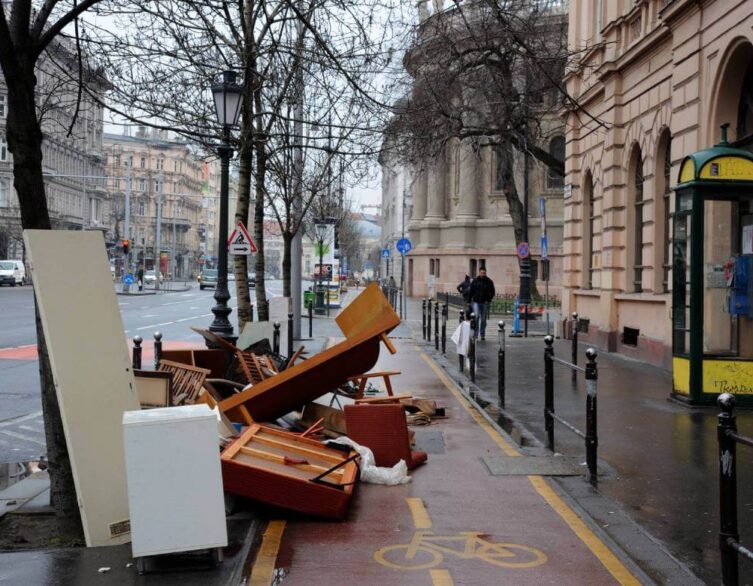The New Waste Collection System in Budapest: The End Of An Era?

The recent restructuring of waste collection services in Budapest by MOHU will make it literally harder to get rid of accumulated junk in homes. Every year, the residents of Budapest can take advantage of the FKF’s annual, pre-determined, and publicly announced free bulky waste collection service, allowing them to dispose of large items generated in households. The collection process and challenges are detailed here. The FKF determines the collection dates in consultation with district municipalities, taking into account public holidays. Districts are divided into zones, from which the bulk waste is collected concentratedly in one day, with removal taking place the day after placement, as outlined by the current regulations for bulky waste disposal by FKF.
Changes to Waste Collection System: MOHU’s Controlled Collection Points
Starting in 2025, MOHU will introduce a new controlled collection point system where only a few locations per district will serve as collection points for residents to transport their unwanted junk themselves. This means that in each district, approximately 10 guarded collection points will be available at specified times for residents to drop off their items. The furthest distance a collection point can be from a residence is 800-1000 meters but will likely be much closer. All collection points will be open for three days, with continuous waste removal promised during the collection period.
Residents who have struggled to carry items such as bed frames or old TV boxes filled with magazines down from upper floors know that even bringing these items to the curb can be challenging. But if these items have to be taken by car and with assistance to a designated point in a certain district, it is foreseeable that this will not only be a problem for those with mobility issues or elderly individuals living alone. MOHU has stated that door-to-door service will still be available upon request, allowing district municipalities to designate addresses based on need where the provider will go cost-free and collect the waste. However, questions arise about who decides who is in need? Will it be the retired pensioner, the single mother raising two young children on her own, a weightlifter who has fallen seriously ill during waste collection time? Or someone who lives demonstrably further from the nearest collection point than 1 kilometer? Anyone who previously managed with just a few meters can rightfully claim that they are unable to carry a set of shelves one kilometer away.
Best deals of Budapest
Criticism of the New System: Concerns and Disagreement
During a meeting of Budapest’s urban development committee led by Vitézy Dávid on Monday, both government and opposition leaders criticized the new waste collection system set to be introduced next year. MOHU confirmed last week that there would be radical changes to the existing waste collection practices: up to 10 receiving points could operate per district every three days next year. Experts at these points would receive discarded items and place them in containers that their staff would continuously empty. Previously, large household waste could simply be left at the curb for garbage trucks to pick up.
At the committee meeting, Mártha Imre represented MOHU, which belongs to Mol Group and is also CEO of Budapest Public Utilities (BKM) Zrt. He emphasized the positives at the meeting, such as eliminating strain on green spaces, street pollution due to dumping of waste on streets and curbing illegal dumping from outside Budapest.
However, representatives from Fidesz and opposition parties expressed different views at the committee meeting. Gulyás Kristóf highlighted how cumbersome it is in practice for people to use waste yards; they are constantly being sent back and forth with their junk.
Vitézy Dávid noted that the new system goes against desirable car-free urban life advocated by city management since it is quite difficult for individuals to carry a sofa or cabinet on their backs to designated collection points. Balogh Balázs from Tisza Party fully agreed with Gulyás and Vitézy; moreover, he believed people would continue to leave trash on the streets since they might not be able to transport it or might learn about collection site setup too late.
Kiss Ambrus from City Hall’s main office mentioned that City Council would discuss this issue and emphasized that they had not been consulted on this matter.
Benefits of New Waste Collection System According to MOHU
MOHU expects several benefits from its new controlled waste collection system:
- Clean recyclable waste fractions under controlled conditions
- Proper disposal of hazardous waste
- Maintaining clean cityscape during waste disposal
- Minimal impact on residents’ daily lives
- Promotion of environmental responsibility at individual level
The introduction of controlled collecting points aims at cleaner cities during waste disposal periods while making recycling easier for residents. It also aligns with sustainable waste management principles endorsed across European Union cities.
Conclusion
While MOHU emphasizes positive aspects such as better recycling opportunities and reduced strain on public spaces with its new controlled point system for waste collection in Budapest, concerns remain regarding practicality and accessibility for residents. As stakeholders continue discussions surrounding this topic, finding a balanced approach that ensures both efficient waste management practices and resident convenience will be crucial for successful implementation going forward.
Image source: FKF
Related news












